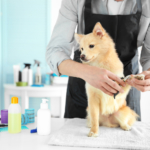- lmplovemypuppy
- April20,2024
- 824
- 0
Are you a proud puppy parent eagerly anticipating your furry friend’s next milestone? One of the most significant developmental stages for puppies is teething, a process that marks the transition from puppyhood to adulthood. Let’s delve into the fascinating world of puppy teething and discover when this natural process typically begins.
The Journey of Puppy Teething
1. Early Signs of Teething:
- Age Milestone: Most puppies begin teething around the age of 3 to 4 months, although the timing can vary slightly depending on the breed and individual development. Teething marks the stage when your puppy’s baby teeth start to loosen and fall out, making way for their permanent adult teeth.
- Chewing Behavior: One of the first signs that your puppy is teething is an increase in chewing behavior. You may notice your furry friend gnawing on toys, furniture, or even your fingers as they seek relief from the discomfort of emerging teeth.
2. Teething Timeline:
- Primary Teeth Shedding: As your puppy’s adult teeth begin to emerge, their primary (baby) teeth will gradually loosen and fall out. This process typically starts with the incisors, followed by the canine teeth and premolars.
- Full Set of Adult Teeth: By the age of 6 to 8 months, most puppies will have fully transitioned to their adult teeth, which are stronger and better suited to their chewing needs. During this time, you may notice a mix of adult and baby teeth in your puppy’s mouth as the transition progresses.
Supporting Your Puppy Through the Teething Process
1. Provide Safe Chew Toys:
- Teething Relief: Offering a variety of safe and durable chew toys can provide much-needed relief for your teething puppy. Look for toys specifically designed for teething puppies, such as rubber or nylon toys that are gentle on their gums and teeth.
- Cold Comfort: Refrigerating or freezing some of your puppy’s chew toys can provide additional relief by numbing their gums and soothing soreness. Just be sure to supervise your puppy during playtime to prevent them from chewing on toys that could pose a choking hazard.
2. Gentle Dental Care:
- Regular Brushing: Introducing your puppy to a regular dental care routine early on can help promote good oral hygiene and prevent dental issues in the future. Start by gently brushing your puppy’s teeth with a soft-bristled toothbrush and dog-friendly toothpaste formulated for puppies.
- Chewing Alternatives: In addition to chew toys, offering raw bones or dental chews designed to promote healthy teeth and gums can help keep your puppy’s mouth clean and provide mental stimulation.
Expert Guidance and Support at Love My Puppy
At Love My Puppy, puppies for sale near West Palm Beach, we understand the importance of supporting your puppy through every stage of their development, including teething. Our knowledgeable team is here to provide guidance and assistance as you navigate the exciting journey of puppy parenthood. If you have any questions about puppy teething or are interested in adopting a furry friend of your own, contact Love My Puppy at (561) 368-6767. With Love My Puppy by your side, you’ll have all the resources and support you need to ensure a happy and healthy life for your canine companion.


